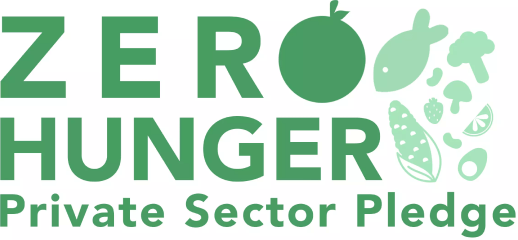
Webinar discusses how companies implement their pledges
Company commitments made to the Zero Hunger Private Sector Pledge as of the end of 2022 have generated investments of USD 140 million of investment in 103 projects across 46 countries. These are the results from the first accountability report unveiled by the Zero Hunger Private Sector Pledge during a recent webinar.
“This is an important start,” noted the co-moderator Carin Smaller from the Shamba Centre for Food & Climate who coordinate the Pledge secretariat. “But as we know, much more needs to be done. With COP28 approaching, many pledges will be made and questions will arise whether they can be implemented. The Pledge’s accountability report showcases how we can move from pledge to action.”
Report results
Manuela Moollan from Walk the Talk consultancy, which defined the Pledge’s reporting framework and engaged with reporting companies as part of the accountability process, provided a brief overview of the report findings.
The evaluators tracked the projects deployed for the 16 companies which had made commitments of at least USD 1 million before the end of 2022. “We developed the framework in close collaboration with the Pledge technical committee and in consultation with pledging companies with the aim of balancing the need for accountability and transparency with a reasonable reporting burden on pledging companies,” remarked Manuela.
According to the report findings, 77% of investments have been deployed as core business investments, thus signalling that pledging companies are integrating SDG 2 in their core operations rather than as donations or philanthropy. The report found that more than half of investments – 56% - are aligned with environmental sustainability goals and specifically support sustainable practices, reduce post-harvest losses and support the adoption of climate-resilient crops.
Few projects have been implemented in Africa and other higher priority countries. Rather Africa only represented 34% of projects while 44% of projects were deployed in Asia and 22% in Latin America. “Only eight projects were deployed in high priority countries, compared to 108 in low priority countries and 56 in medium priority countries,” noted Manuela.
Showcasing company projects
To bring life to the report findings, the Pledge invited three companies to share details about their Pledge projects.
Arla Foods Ingredients joined the Pledge in 2021 with the intention of reducing post-harvest losses in Ethiopia. However, because of the challenging political situation, Arla Foods Ingredients moved its operations to Pakistan for a new project known as Whey2Value.
As explained by Bongki Engel, this project utilises side streams – or what is normally characterized as waste – to help local dairy producers develop new and innovative products that are affordable and nutritious based on whey. “For a successful project, we have learned that it is essential to have local commercial commitments, cross-sector public-private partnerships and a stable political environment,” said Bongki.
Sharon Jean Gonzales-Gulmatico shared how her company, Morination, has embedded SDG 2 into its corporate strategy. Through its Million Moringa Movement, the company has pledged nearly USD 2 million to support the adoption of climate-resilient crops in the Philippines. "We aim to equip and empower our farmers with the knowledge and resources to propagate the moringa which is a superfood. By doing so, we can create a resilient food system that is also equitable and accessible to all,” she said.
David Baguma from East-West Seed explained that his company pledged USD 18 million to help train smallholder farmers, primarily women and youth, in sustainable practices. In several refugee settlements in Uganda, the company has trained 23,579 farmers and helped to improve their nutrition and livelihood.
The companies also shared why they joined the Pledge. For Sharon, “Fighting hunger is a moral imperative of the private sector. We have a responsibility to contribute to the fight against hunger, while also addressing environmental sustainability and economic well-being.” Sustainability is also important to East-West Seeds. As David noted, “Climate change is a global challenge and we need to find solutions that mitigate its impact while also increasing yields.”
The panel discussion ended with an exciting announcement from Arla Foods Ingredients: it renewed its commitment with an additional pledge to expand its Whey2Value project. Bongki also called on other pledging companies to “raise their ambition, get onboard and focus on concrete actions.”
Perspective from Africa
Chola Mfula, the Acting Head of the Private Sector Investment and Agribusiness Unit for AUDA-NEPAD, concluded the webinar with his perspective on private sector investment in Africa. As the report notes, only one-third of projects are deployed in Africa and yet the continent has the most high-priority countries.
According to Chola, “we need to find out why there are more investments in other regions and what measures we should be implementing. We need to find out how to engage with stakeholders to reverse this trend and make investments in African countries more attractive.”
As the number of those suffering from food insecurity continues to increase in Africa and the deadline to achieve SDG 2 approaches, bold approaches will be needed. “How do we attract business and how do we make business thrive and meet SDG goals of zero hunger? What is holding back investment? This is what we want to understand and change,” he noted.
Lawrence Haddad from GAIN, a strong supporter and co-founder of the Pledge, closed the webinar with an appeal for private sector engagement. “As conflicts raging worldwide make clear: donors and governments can’t do it on their own and need the private sector to step up. And as the accountability report shows, they are doing so.
The next step, however, is turning action into impact on the ground. There is a real sense of momentum, of commitment and, hopefully, of impact. We have never needed the private sector more,” he concluded.
